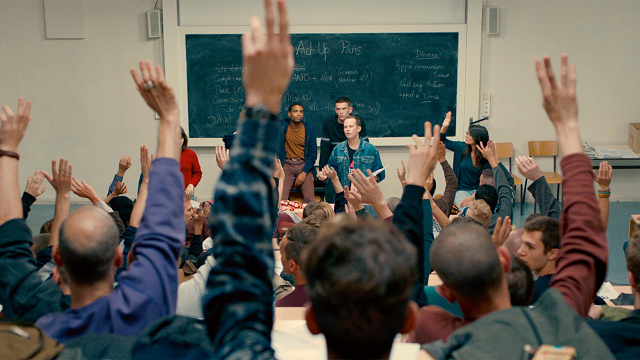They say that the heart of a man under duress beats at 120 beats per minute.
I’ve said the AIDS drama is done. It’s over. Played out. If we’ve seen it once, we’ve seen it 1000 times. It’s always the same old thing. Two men fall in love against a backdrop of death and disease while a bunch of people are fighting for their lives. The AIDS drama is a “burningly raw slice of life” designed to play your heart strings every 15 minutes while presenting a group of recurring white male faces symbolizing The Man for audiences to stand against. Play it too far to one side, the AIDS Drama falls into easy heroics; play it too far to the other, and the drama falls into a gay-ass weepie.
BPM is hardly an exception to the AIDS drama formula. Set in the early 90s, when gay men and heroin addicts were dropping like flies, ACT-UP Paris threw down its gauntlets against an uncaring government at the mercy of an American for-profit health care industry. Founded in 1989, two years after ACT-UP New York (the subject of The Normal Heart), ACT-UP Paris sought to disrupt Parisian life so that they could educate the public about HIV and HIV Prevention while securing universal access to newly developed treatments.
However, BPM is not about ACT-UP the group so much as it’s about ACT-UP the activists. Nearly all political groups are inherently messy. The people within these groups may share a common goal, and they may seem like they act in a unified intentional manner, but that’s all a show. Behind the surface, no matter how successful any group may seem, activist groups are a teeming mess of raw humanity pushed to the brink of civility by the injustice they perceive in the world.
Writers Robin Campillo and Philippe Mangeot pulled from their own experiences in ACT-UP to go deep into activism brought to a boil by the specter of impending death; as one guy comments about ACT-UP’s plans during Pride, he’s going to celebrate this Pride like its going to be his last. Knowing they’re living on borrowed time just means everybody is that much more impatient, angry, and on edge. BPM opens with a group of activists waiting off stage to disrupt an HIV lecture. The next 15 minutes are a post-disruption breakdown of what was being disrupted, how the disruption was supposed to happen, how it went wrong, and how outside groups are perceiving the new actions. That is: one young man jumped the gun and threw his balloon full of fake blood at the targeted speaker well ahead of schedule. Amidst the confusion caused by the early deployment, another young man used handcuffs to chain up the speaker for the first time. A simple protest quickly spiralled out of control because of the pressure cooker environment everybody is living under.
AIDS Activism was always personal. It wasn’t fighting for an unknown ideal (e.g. the anti-nukers I met during the late 1990s), and it wasn’t fighting for a better “future.” AIDS Activism was a marathon run for their lives. It was simple: failing to get people to listen in time, meant that they would die. Their friends were dying, their family was dying, their fellow activists were dying. People had to fight for years to get heard by enough people to save the afflicted communities. As such, the other half of BPM is a romance between a cute lithe HIV+ boy and a hunky young HIV- boy. They each have pasts, they each want futures. But, what can you do with your future when your future is unknown? When the HIV- boy asks “What do you do?” the HIV+ boy replies, “I’m positive. That’s it.”
BPM isn’t here to make you think ACT-UP was a perfect organization. Sure, Campillo is here to advocate for the work that ACT-UP accomplished, but the movie is here largely to sing to the choir. BPM is here to say “We saw you. We were with you. We recognize you. You did good.” Seeing BPM in a packed house amongst queer friends and loved ones of all ages, I saw the breadth of reactions in the audience. Those who were at the front lines of the fight in America were breaking down at the end of the movie. One of my dearest friends broke down sobbing once she escaped the theater. And yet, other friends said they didn’t need to sit through over an hour of the exact activist meetings that frustrated them in the first place.
Like most of the dreaded AIDS Activist movies, Campillo can’t avoid pulling the heart strings even if his stance seems muted. There’s something more than emotional manipulation at work here. BPM is neither history lesson nor memorial. It is the emotional record of an era not so long ago. The current days of back biting, in fighting, and radical miscalculations is not a new thing. Activism has long been messy and nasty and mean. It takes guts, resilience, passion, and patience…even when the reaper is looking over your shoulder. Like actual activism, BPM is messy, dirty, mean, and it takes a lot longer than it should. It’s a movie to respect more than enjoy.

